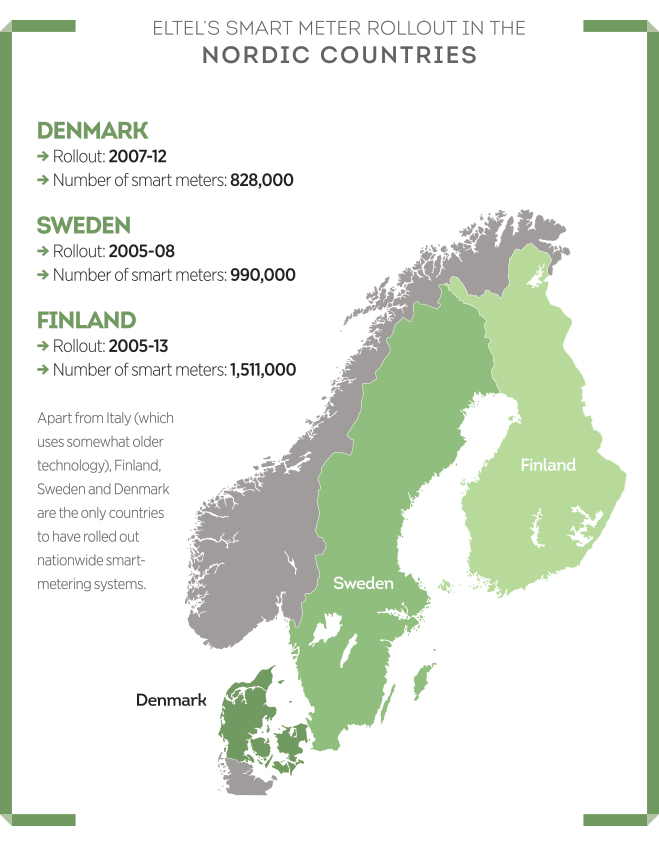Eltel Group: powering Europe’s infranets for a smarter recovery
Europe’s ageing power infrastructures are a hamper to its economic recovery. Eltel Group, winner of our award for Best Smart Grid Company, Europe, 2014, is helping shape the future of the continent’s infranets

Axel Hjärne, President and CEO of Eltel Group Corporation: the company has been helping Europe restore its competitive edge through innovative infranet solutions
As Europe tries to restore its competitive edge, the role of energy policy has come under review. The optimistic view of Europe as a showcase of well-managed climate policy has been challenged by the continent’s biggest economy: Germany. The radical policy of Energiewende – through which Germany boosted the share of renewables in its energy mix – has lately faced the realities of budget: the cost and fairness of subsidies, as well as the cost to citizens (with some being forced into so-called ‘fuel poverty’), have come under scrutiny.
Energy policy is a balancing act between availability, acceptability and affordability. For a period, it seems, too little attention was paid to affordability – a trend that has come under criticism as the recovery of the European economies has proven slower than expected. The shale gas boom in the US has also had a major impact on the competitiveness of Europe: the price European industry is paying for energy is suddenly too high. The question is, what should be done to secure a long-term future with enough energy, in which the impact on the climate is acceptable, and the prices industry and consumers pay are affordable?
Trends and drivers
A recent study by Eltel identified the following trends and drivers affecting European energy transmission and distribution: ageing grids; the fulfilment of an internal EU energy market; the continued introduction of renewable energy sources (RES), and their connection to the grid; increased demands on load management; net availability and reliability; and smart grids.

Many of Europe’s transmission and distribution networks are over 50 years old and approaching the end of their technical life. This means a natural need for rehabilitation and technological upgrades. Several key projects have been identified to reduce grid congestion and allow a higher degree of electricity market coupling. Higher load variability is driving investments in transmission upgrades due to RES. Peak load power will increase until 2020. Modern transmission nets and congestion management are needed due to intermittent power sources (such as wind and solar power) and load variability.
Stricter requirements from regulators encourage utilities to increase net availability and reliability. Extreme weather conditions have shown the vulnerability of distribution infrastructures: in Northern Europe, for example, storms have inflicted significant damage on electricity infrastructures over the past couple of years. This is partly due to the number of overhead lines in rural areas. Due to new regulations on climate-proofing electricity networks, utilities have established 15-year investment programmes to convert to underground cabling.
Many of the trends we have mentioned are driving the development of smart grids – a process that began with the automation of transmission networks in the 1970s and which has since taken huge steps through the introduction of medium- and low-voltage nets. However, the automation is not complete and a lot remains to be done if the whole supply chain is to be brought online and under better control.
Pioneering the infranet solution
Eltel is a Northern European infranet service company whose main business is engineering, building and caring for electricity and telecommunication networks. For decades, the company has worked with the leading operators both in electricity (El) and telecommunications (Tel). Eltel was divested by the Nordic energy company Fortum in 2001 and sold to private equity investors. The company launched a new strategy to integrate its best competences in El, Tel and IT/IP, to offer outsourced solutions and services to utilities: economy of scale and scope, compared to in-house operations, would give the company its competitive edge. Since its establishment, Eltel has grown six-fold, operating in 10 European countries and undertaking a number of electrification projects in fast-growing African countries. The company is typically a partner to all the leading power and telecom operators in the markets in which it operates.
Eltel has grown six-fold, operating in 10 European countries and undertaking a number of electrification projects in fast-growing
African countries
“We have all the technical competences that today’s infrastructures require,” says Axel Hjärne, President and CEO of Eltel Group Corporation. “Next, we must act as a service organisation, delivering value to our customers in all kinds of situations. And thirdly, this must be a business for us. The need for change for our employees, management and culture has been huge. Looking at our success, we could claim we have been successful at changing the earlier government-led, monopolistic markets and culture into an open and competitive marketplace. We need to understand the needs of utilities in a bigger picture, and we need to master the smallest details day after day. Our management system is called ‘the Eltel Way’, which sets all the important company practices needed to run a successful business.”
Shaping future infranets
Having established itself as a reliable partner to operators, it has become more important that Eltel proves itself a proactive partner in the deployment of new technologies. At the end of 2013, Eltel fitted the last homes in Finland with smart metres – completing Fortum’s 600,000-meter installation project. Hjärne says: “Today, consumers can follow their hourly consumption patterns of electricity, change their consumption behaviour and even buy electricity hourly on the spot market. This is a huge change from before. For the utilities, the online connection provides a new customer relationship interface, and a platform to develop new business models and offerings. In controlling the network status, they can now localise any disturbances to availability after storms online, and Eltel maintenance teams can be dispatched, without delay, directly to sites.
“For the electricity industry, the most efficient way to reduce emissions would be higher energy efficiency. There have been good pilots to improve the efficiencies but obviously one of the problems at the policy level has been the lack of reliable ways to report energy efficiency at a national – not to mention a European or global – level. However, this opportunity is still there, and Eltel is taking full advantage of it both in the pilot developments and large-scale technology deployments.
While we have established the competences to deliver the solutions, our next step is to offer these solutions to new customers. Besides Finland, Sweden and Denmark, only Italy – with somewhat older technology – has rolled out nationwide smart-metering systems. Maintaining the performance level of existing networks by well planned and efficient upgrades, rehabilitation and maintenance services, and providing the best solutions in an efficient manner in new infrastructure investments is necessary for Europe to secure the critical availability of electricity and telecommunications.”













